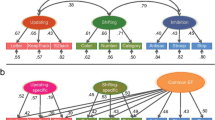Abstract
The cholinergic system is essential in mediating cognitive processes. Although there has been extensive research regarding cholinergic receptor subsystems, the specific contribution of the muscarinic and nicotinic receptor system to cognitive processes still has not been sufficiently explored. In the present study, we examined the selective contribution of muscarinic and nicotinic antagonism to cognitive performance in healthy human subjects. A single-blind, double-dummy, time-elapsed, repeated measures cross-over design was used on 15 healthy males. Subjects completed a neuropsychological test battery assessing a wide range of cognitive domains after 0.4 mg scopolamine (intravenous), 0.2 mg/kg mecamylamine (max. 15 mg; oral) or placebo. Subjects were tested under three conditions: placebo/placebo (PP), scopolamine/placebo (SP) and mecamylamine/placebo (MP). Results show that scopolamine significantly impaired the free recall and recognition performance in the verbal learning test. No other cognitive domain was affected, neither by scopolamine nor by mecamylamine. In line with the existing literature, antagonism of muscarinic receptors resulted in specific cognitive impairments, predominantly memory performance.
Similar content being viewed by others
References
Aarsland D, Larsen JP, Reinvang I, Aasland AM (1994) Implications for the cholinergic hypothesis in dementia of the Alzheimer type. Brain 117:1377–1384
Aschenbrenner S, Tucha O, Lange KW (2000) Regensburger Wortflüssigkeitstest (RWT). Hogrefe Verlag, Goettingen
Brickenkamp R (1994) Test d2 Aufmerksamkeits-Belastungs-Test. 8. ueberarbeitete und neu normierte Auflage. Hogrefe Verlag, Goettingen
Deutsch JA (1971) The cholinergic synapse and the site of memory. Science 174:788–794
Ellis JR, Ellis KA, Bartholomeusz CF, Harrison BJ, Wesnes KA, Erskine FF, Vitetta L, Nathan PJ (2006) Muscarinic and nicotinic receptors synergistically modulate working memory and attention in humans. Int J Neuropsychopharmacol 9:175–189
Everitt BJ, Robbins TW (1997) Central cholinergic system and cognition. Annu Rev Psychol 48:649–684
Flicker C, Serby M, Ferris SH (1990) Scopolamine effects on memory, language, visuospatial praxis and psychomotoric speed. Psychopharmacology 100:243–250
Haerting C, Markowitsch HF, Neufeld H, Calabrese P, Deisinger K, Kessler J (1999) WMS-R (Wechsler Gedächtnistest—Revidierte Fassung. Manual). Verlag Hans Huber, Goettingen
Helmstaedter C, Lendt M, Lux S (1990) VLTM: Verbaler Lern- und Merkfähigkeitstest. Manual. Beltz Test GmbH, Goettingen
Koller G, Satzger W, Adam M, Wagner M, Kathmann N, Soyka M, Engel R (2003) Effects of scopolamine on matching to sample paradigm and related tests in human subjects. Neuropsychobiology 48:87–94
Kopelman MD (1986) The cholinergic neurotransmitter system in human memory and dementia: a review. Q J Exp Psychol 126:37–349
Langmead CJ, Watson J, Reavill C (2008) Muscarinic acetylcholine receptors as CNS drug targets. Pharmacol Ther 117:232–243
Lehrl S (2005) Mehrfachwahl-Wortschatz Intelligenztest, MWT-B. Spitta Verlag GmbH & Co. KG, Balingen
Levin ED, McClernon JF, Rezvani AH (2006) Nicotinic effects on cognitive function: behavioral characterization, pharmacological specification and anatomic localization. Psychopharmacology 184:523–539
Little JT, Johnson DN, Minichiello M, Weingartner H, Sunderland T (1998) Combined nicotinic and muscarinic blockade in elderly normal volunteers: cognitive, behavioral and physiologic responses. Neuropsychopharmacology 19:60–69
Mancuso G, Andres P, Ansseau M, Tirelli E (1999) Effects of nicotine administered via a transdermal delivery system on vigilance: a repeated measure study. Psychopharmacology 142:18–23
Martin LF, Kem WR, Freedman R (2004) Alpha-7 nicotinic receptor agonists: potential new candidates for the treatment of schizophrenia. Psychopharmacology 174:54–64
Newhouse PA, Potter A, Corwin J, Lenox R (1992) Acute nicotinic blockade produces cognitive impairment in normal humans. Psychopharmacology 108:480–484
Newhouse PA, Potter A, Corwin J, Lenox R (1994) Age-related effects of the nicotinic antagonist mecamylamine on cognition and behaviour. Neuropsychopharmacology 10:93–107
Newhouse PA, Potter A, Kelton M, Corwin J (2001) Nicotinic treatment of Alzheimer`s disease. Biol Psychiatry 49:268–278
Polster MR (1993) Drug-induced amnesia: implications for cognitive neuropsychological investigations of memory. Psychol Rev 114:477–493
Rasch BH, Born J, Gais S (2006) Combined blockade of cholinergic receptors shifts the brain from stimulus encoding to memory consolidation. J Cogn Neurosci 18:793–802
Reitan RM (1958) Validity of the trail making test as an indicator of organic brain damage. Percept Mot Skills 8:271–276
Rezvani AH, Levin ED (2001) Cognitive effects of nicotine. Biol Psychiatry 49:258–267
Robbins TW, Semple J, Kumar R, Truman MI, Shorter J, Ferraro A, Fox B, McKay G, Matthews K (1997) Effects of scopolamine on delayed-matching-to-sample and paired associates tests of visual memory and learning in human subjects: comparison with diazepam and implications for dementia. Psychopharmacology 134:95–106
Sacco KA, Germine A, Seyal A, Dudas MM, Vessicchio JC, Krishnan-Sarin S, Jatlow PI, Wexler BE, George TT (2005) Effects of cigarette smoking on spatial working memory and attentional deficits in schizophrenia: involvement of nicotinic receptor mechanisms. Arch Gen Psychiatry 62:649–659
Sarter M, Parikh V (2005) Choline transporters, cholinergic transmission and cognition. Nat Rev Neurosci 6:48–56
Sherman SJ, Atri A, Hasselmo ME, Stern CE, Howard MW (2003) Scopolamine impairs human recognition memory: data and modeling. Behav Neurosc 117:526–539
Thiel CM, Friston KJ, Dolan RJ (2002) Cholinergic modulation of experience-dependent plasticity in human auditory cortex. Neuron 35:567–574
Thompson JC, Stough C, Ames D, Ritchie C, Nathan PJ (2000) Effects of the nicotinic antagonist mecamylamine on inspection time. Psychopharmacology 150:117–119
Tucha O, Lange KW (2004) TL-D Turm von London—Deutsche version. Manual. Hogrefe Verlag, Goettingen
Acknowledgments
Supported by the Deutsche Forschungsgemeinschaft (DFG—KFO 112).
Conflict of interest
The authors declare that they have no conflict of interest.
Author information
Authors and Affiliations
Corresponding author
Rights and permissions
About this article
Cite this article
Voss, B., Thienel, R., Reske, M. et al. Cognitive performance and cholinergic transmission: influence of muscarinic and nicotinic receptor blockade. Eur Arch Psychiatry Clin Neurosci 260 (Suppl 2), 106–110 (2010). https://doi.org/10.1007/s00406-010-0160-8
Received:
Accepted:
Published:
Issue Date:
DOI: https://doi.org/10.1007/s00406-010-0160-8




